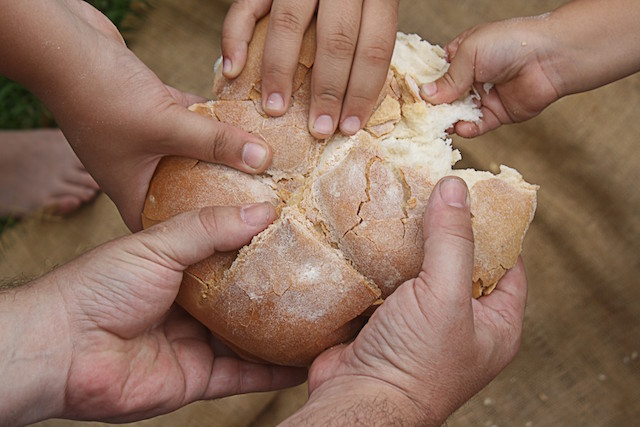Growing up, my family was not “grace-full.”
What I mean is that we didn’t consistently say grace at mealtimes. My family was ostensibly Catholic or Methodist, but not practicing and unsure of how to relate to God, prayer, and church. For special occasions, a mealtime prayer might pop out. But it was odd, because the context wasn’t there.
When my parents’ marriage fell apart, whatever ritual or routine we had disappeared. Each day, each season, each holiday was different for me.
After my son was born six years ago, I longed to say grace at our meals. But I didn’t know how. My husband and I were carrying forward the uncomfortable uncertainty about the role of the divine in our lives, so just piping up with a grace at dinner didn’t have the underlying foundation.
I realize now that we all long for the deep connection of rituals shared with ourselves and among family and friends. As parents, we need to give ritual to our children, and perhaps heal ourselves in the same way.
“Rituals are the lenses through which we see our emotional connection to each other, to a culture, and to a higher power. They are symbolic expressions of our most sacred values,” writes Becky Bailey in her book and video, I Love You Rituals.
Research suggests that children who take part in family meals are 35 percent less likely to have an eating disorder, 12 percent less likely to be overweight, 24 percent more likely to eat healthy foods, and that they are less delinquent, achieve more academically, display improved psychological well-being, and experience more positive family interactions.
Everything handled in just one meal a day. Impressive, huh?
Even if these benefits of eating are a bit optimistic or overstated, less depression is an outcome I’ll gladly take, given that suicide is the second-leading cause of death in children aged 10–24.
We know routine for children builds their sense of security and develops self-discipline and confidence. In her book Calm and Compassionate Children: A Handbook, Susan Usha Dermond says, “Daily routines are especially calming for the young child…you can help your child to transition smoothly from one activity to the next.” (Like bedtime, ahk!)
“Doing the same thing at the same time each day reminds [children] of yesterday and the day before; to them, that cycle is comparable to the cycle of seasons as adults perceive it.”
So is mealtime a ritual or merely a calming routine? How do we create meaningful ritual?
Dermond answers, “What makes a ritual is that it is an event meaningful to adults that children can join in. If it is something for them to do alone, it’s not a ritual or celebration—it’s a child’s activity. Your presence—talking about the day, telling a story of what you did as a child, or just listening—is the most important element.”
It turns out my internal niggling about saying grace was important for turning our routine meal into a meaningful ritual.
Family mealtimes may be superfood, according to research, but it is the joy we share that really nourishes us.
Now, for every meal, even on the go, we hold hands and sing together the Ananda blessing: “Receive, Lord, in Thy light, the food we eat, for it is Thine. Infuse it with Thy love, Thy energy, Thy life divine.”
This is, bar none, the sweetest moment of every day for me.
That our son participates fully, with joy and without interrupting the whole meal with nutty antics, is a bonus blessing of both the routine and the ritual.
He even brought home a couple of blessings from school that we sing second: “For health and strength, and daily bread, we thank you now, O Lord. Aum.” And the Johnny Appleseed blessing: “Oh, the Lord is good to me, and so I thank the Lord for giving me the things I need: the sun, and the rain, and the apple seed. The Lord is good to me.”
Saying grace before meals has become a cornerstone of our spiritual practice and family life.
Whether grace is a moment of quiet for you or a prayer, giving thanks before meals seems to be universally human and mindful. Many graces are rooted in religious traditions—like the Tibetan Buddhist prayer before meals, called damchoe—and many more have simply arisen spontaneously: sweet moments to express our gratitude for our lives, our food, our families.
From Moravia to Ireland, Tibet to Argentina, saying grace before meals is a mindful moment of being human, a ritual to share our humanity, deepen our connection, and spread seeds of joy.
~
Author: Jacqueline Debets
Image: Public Domain Pictures
Editor: Callie Rushton









Read 0 comments and reply